
Tanzania,officially the United Republic of Tanzania,is a country in East Africa within the African Great Lakes region. It is bordered by Uganda to the northwest;Kenya to the northeast;the Indian Ocean to the east;Mozambique and Malawi to the south;Zambia to the southwest;and Rwanda,Burundi,and the Democratic Republic of the Congo to the west. Mount Kilimanjaro,Africa's highest mountain,is in northeastern Tanzania. According to the 2022 national census,Tanzania has a population of nearly 62 million,making it the most populous country located entirely south of the equator.
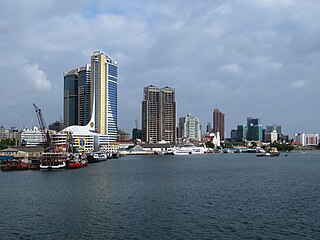
The economy of Tanzania is a lower-middle income economy that is overwhelmingly dependent on agriculture. Tanzania's economy has been transitioning from a planned economy to a market economy since 1985. Although total GDP has increased since these reforms began,GDP per capita dropped sharply at first,and only exceeded the pre-transition figure in around 2007.

Julius Kambarage Nyerere was a Tanzanian anti-colonial activist,politician and political theorist. He governed Tanganyika as prime minister from 1961 to 1962 and then as president from 1962 to 1964,after which he led its successor state,Tanzania,as president from 1964 to 1985. He was a founding member and chair of the Tanganyika African National Union (TANU) party,and of its successor Chama Cha Mapinduzi,from 1954 to 1990. Ideologically an African nationalist and African socialist,he promoted a political philosophy known as Ujamaa.

Ali Hassan Mwinyi was a Tanzanian politician who served as the second president of the United Republic of Tanzania from 1985 to 1995. Previous posts included Minister for Home Affairs and Vice President. He also was chairman of the ruling party,the Chama Cha Mapinduzi (CCM) from 1990 to 1996.
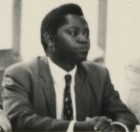
Rashidi Mfaume Kawawa was the second Tanganyikan Prime Minister,Preceded by Julius Kambarage Nyerere from 22nd Jan 1962 to 9th Dec 1962 when the post was abolished and the first Tanzanian Prime Minister from 17th Feb 1972 to 13th Feb 1977,succeeded by Edward Sokoine.

Mark James Mwandosya is a Tanzanian CCM retired politician and a former Member of Parliament for Rungwe East constituency,who is currently serving as the chairman of the Board of Directors of Ewura Tanzania and the chairperson of the Energy Regulators Association of East Africa Annual General Assembly.
The Dar es Salaam International Trade Fair (DITF) also known as Saba Saba Day takes place annually on the seventh of July at the Mwalimu J.K.Nyerere Trade Fair Grounds. It is located along Kilwa Road,8 km south east of Dar es Salaam in Tanzania.
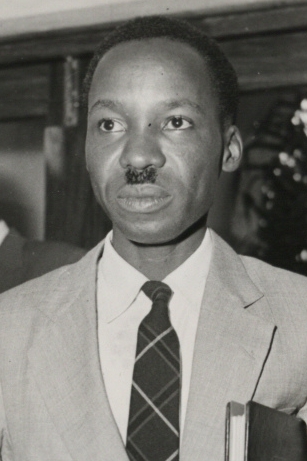
Ujamaa was a socialist ideology that formed the basis of Julius Nyerere's social and economic development policies in Tanzania after it gained independence from Britain in 1961.

Julius Nyerere International Airport is the international airport of Dar es Salaam,the largest city in Tanzania. It is located in Kipawa ward of Ilala District in Dar es Salaam Region of Tanzania. The airport has flights to destinations in Africa,Asia,Europe,and the Middle East. It is named after Julius Nyerere,the nation's first president.

The National Museum of Tanzania is a consortium of five Tanzanian museums whose purpose is to preserve and show exhibits about the history and natural environment of Tanzania. The consortium developed from the National Museum of Dar es Salaam,established in 1934 by Tanganyika governor Harold MacMichael. Four more museums later joined the consortium,namely the Village Museum in Dar es Salaam,the National History Museum and the Arusha Declaration Museum in Arusha,and the Mwalimu Julius K. Nyerere Memorial Museum in Butiama.

Katavi Region is one of Tanzania's 31 administrative regions. The region covers an area of 45,843 km2 (17,700 sq mi). The region is comparable in size to the combined land area of the nation state of Estonia. Katavi Region is bordered to the east by Tabora Region. The region is bordered to the south by Rukwa Region and Songwe Region. Lastly,Katavi borders DRC on Lake Tanganyika to the west. The region derives its name from Katavi,the spirit of lake Tanganyika. The regional capital city is Mpanda. According to the 2022 national census,the region had a population of 1,152,958.
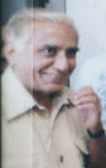
Amir Habib Jamal was a Tanzanian politician and diplomat who served as a Minister under various portfolios in the Julius Nyerere administration. He represented the parliamentary constituency of Morogoro from 1960 to 1985,and was Tanzania's longest-serving Finance Minister and led the ministry for about 12 years.
Jeremiah Kasambala was one of the first ministers in the cabinet of Julius Nyerere after Tanganyika won independence from Britain on 9 December 1961. He rose to prominence when he was the head of the Rungwe African Cooperative Union in Rungwe District in the Southern Highlands Province.
Malangali Secondary School was one of the leading academic institutions in colonial Tanganyika. It retained its reputation for academic excellence after Tanganyika won independence from Britain in December 1961.
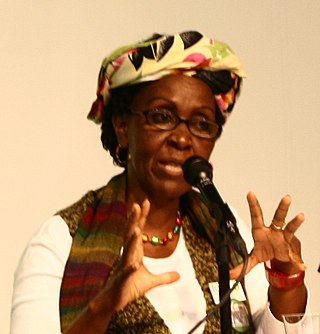
Elieshi Lema is a Tanzanian writer and publisher,also active in Tanzania's civil society.

Tanzania–United Kingdom relations are bilateral relations between Tanzania and the United Kingdom. The United Kingdom has historically been a partner of Tanzania in many areas,particularly trade and security.

Medard Matogolo Kalemani,commonly known as Medard Kalemani,is a Tanzanian lawyer and politician,who served as the Minister of Energy in the Tanzanian cabinet,in 2017-2021. Immediately prior to his appointment to his current cabinet position,he served as Deputy Minister of the combined energy and minerals ministry,which was split into two,with Angellah Kairuki,assuming the mining docket.
Augustine Saidi,or Augustino B. Saidi,was a Tanzanian lawyer who was the first African Chief Justice of Tanzania.
Mwalimu Nyerere University (MJNUAT),whose complete name is Mwalimu Julius Kambarage Nyerere University of Agriculture and Technology (MJNUAT),is a public university in Tanzania. MJNUAT focuses on the instruction of agricultural sciences,agricultural mechanization,and agribusiness.















